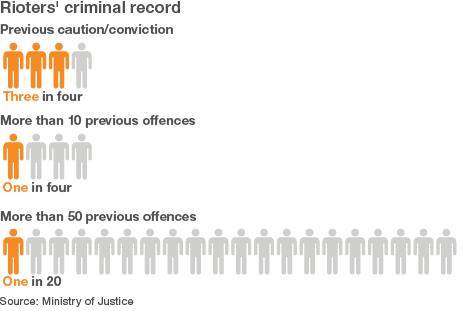One in four riot suspects had 10 previous offences
- Published
Ken Clarke: "It confirms my fear that criminals were on the rampage"
One in four people charged over the riots in England had committed more than 10 past offences, figures show.
Three-quarters had a previous caution or conviction, Ministry of Justice (MoJ) figures, external show, and those with a criminal record averaged 15 offences.
This showed "existing criminals were on the rampage" during last month's riots, said Justice Secretary Kenneth Clarke.
The justice system needed changes "to ensure both effective punishment and reform to tackle reoffending", he said.
"I am dismayed to see a hardcore of repeat offenders back in the system."
'Lawless looting'
During the nights of rioting in early August, they had taken "to the streets in lawless looting and just plainly had got no nearer to the values of ordinary society", Mr Clarke told BBC News.
"The courts, the prisons and the justice system's got to tackle how we reform as many of these people as are capable of reform - how do we stop them reoffending?
"We can't just churn them through the system all the time and watch them ... come back as they're doing."
Writing in the Times, external earlier, Work and Pensions Secretary Iain Duncan Smith said that social problems behind the riots had been allowed to fester "out of sight of the middle-class majority".
"Last month the inner city finally came to call, and the country was shocked by what it saw," he wrote.
"Too many people have remained unaware of the true nature of life on some of our estates."
Many of these "dysfunctional communities ... had become fertile grounds for drug dealers, gang recruiters and violent moneylenders".
For young people in these areas, gangs were filling "a vacuum left by other figures of authority, particularly the family".
This "vacuum of authority" was accompanied by a "distorted morality" that allowed looters to view "an absence of police protection as an open invitation to steal".
Several nights of violence erupted last month in English cities including London, Birmingham and Manchester.
The MoJ analysis of riot-related court cases shows:
More than half of the 1,715 people who had appeared before the courts as of midday on Monday were aged 20 or under, including 364 under-18s
Of the juveniles, 45% had no previous convictions. Some 95 under 18s have already been sentenced - 69 to custody
Two in three suspects to have appeared before the courts have been remanded in custody
Of 315 people sentenced so far, 176 were given custodial sentences
According to the MoJ, the proportion locked up by magistrates was 43%, compared with 12% for similar offences in England and Wales 2010. The average sentence length was just over five months, compared with two-and-a-half months last year
34 people have been sent to custody for theft - 67% of those convicted, compared with 2% in 2010
Reoffending
Labour's shadow justice secretary Sadiq Khan said that pressure on the prison system hindered efforts to tackle reoffending.
"Prison officers and probation officers, who do such a wonderful job in addressing reoffending behaviour, feel stretched and aren't addressing reoffending behaviour," he said.
"But also we have prisoners, I'm told, who are sitting idly in the cells doing nothing - no productive work, not going on courses, not having their treatment addressed - because prison officers and probation officers are so overstretched, and what I think this is leading to are more and more problems, not solutions."

As part of a "robust social response" to problems in deprived areas, Mr Duncan Smith suggested efforts including:
Tackling gang culture
Support for parents and restoration of discipline in schools "to ensure that young people have the support networks they need throughout childhood"
A welfare system designed "so that work pays"
But he added: "The riots are not just about those at the bottom."
The "distorted morality ... has permeated our whole society, right through to the very top", he said.
"Whether in the banking crisis, phone hacking or the MPs' expenses scandal, we have seen a failure of responsibility from the leaders of our society."